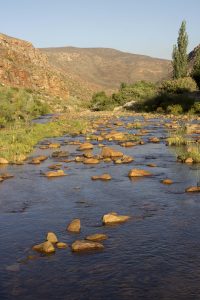Water, most precious resource
- Published:
By: Louisa Feiter
In the world of convenience in which we live today, it is easy to forget the importance and essentialness of water. We open our taps and out it pours, abundantly. For those of us experiencing winter rains, it may even be seen as a nuisance as we dash for our cars or sigh over wet laundry. However if we turn to our holy books we will soon be reminded how sacred water really is. And with World Rivers Day coming up on the 27th September, what better time to give our thoughts and prayers to the lifeblood of our countries.
 A river in the Cedarberg mountains, South Africa, where water is a precious resource in an often hot and dry area.
A river in the Cedarberg mountains, South Africa, where water is a precious resource in an often hot and dry area.
The Qur’an says that “Allah created every [living] creature from water. Some of them go on their bellies, some of them on two legs, and some on four.” (Qur'an, 24:45) So the Qur’an reminds us that life is dependent on water in its fullest sense.
In the Torah and the Bible, the significance of water is shown in the lines: “The earth was formless and empty, and darkness covered the deep waters. And the Spirit of God was hovering over the surface of the waters.” (Genesis 1:2). Before light, living creatures, plants or anything else, there was water.
But more than just being a fundamental substance and life-giver, water is considered as sacred in many texts. Baptism takes place in or with water, and water is seen as the purifier not only of the body, but of the soul. Hinduism places great emphasis on physical and spiritual cleanliness and well-being. Thus many rituals incorporate water and Hindu’s hold a great reverence for it, with certain rivers being considered holy. Many holy places are also therefore located on the banks of rivers, lakes or the coast. In Islam the purifying nature of water is as important, as Muslims must also be ritually pure before approaching Allah in prayer, or salat.
The more one considers water and its place, the more one begins to wonder at the carelessness we can show towards it. Too many rivers are thoughtlessly polluted these days and Rabbi Yonatan Neril’s words come to mind: “Where appreciation ends, misuse begins.” What if we were to begin appreciating our waterways again and rediscover the sacredness that our holy books speak about in them?
When we do this, great things can happen, as is shown by the instance of the NGK Durbanville-Bergsig church taking action. They organised for the whole length of the Kuilsriver, one of the major rivers in the greater peninsula of Cape Town, to be cleaned from both rubbish and alien vegetation. They started out in November last year and have run three clean-up operations. They have involved other organisations like A Rocha, the City of Cape Town and other faith communities to continue this work.
To quote Rabbi Yonatan Neril again, who is the director of Jewish Eco Seminars and the Interfaith Center for Sustainable Development: “Environmental problems at their root are spiritual problems; they stem from a lack of awareness of the Source of all Existence. Once we come to that awareness, we can address environmental problems in very different ways, i.e. from their roots. Since beneath every environmental problem is a spiritual problem, awaiting every environmental problem is a spiritual solution. Drop a stone in the pond and the ripples will reach far beyond you.”
If we are to meaningfully solve our water problems – from pollution to wastage – we should look at connecting on another level. If we have no reverence for water, we will only ever superficially engage in implementing measures to combat our water dilemmas. But if we really re-engage with water’s true significance in our lives, our actions will follow naturally from there. As the Taoists believe, there is much to be learnt from water: “Be still like a mountain and flow like a great river” they say__.__ So we challenge you to find your spiritual connection to water once again, and from there take the actions that are required in your community.
And please share your stories with us, by emailing louisa@safcei.org.za – we always look forward to hearing and sharing stories of positive action that happen in our faith communities.
Who we are

SAFCEI (Southern African Faith Communities’ Environment Institute) is a multi-faith organisation committed to supporting faith leaders and their communities in Southern Africa to increase awareness, understanding and action on eco-justice, sustainable living and climate change.
Featured Articles
-

South Africa: Who Ends Up Paying If DMRE Cooks the Price of Nuclear Power?
-

South Africa’s nuclear energy expansion plans continue to draw criticism, environmental NGOs chew over legal challenge
-

Earthlife Africa and SAFCEI respond to latest unsettling nuclear news regarding the ministerial determination
-

Open Wing Alliance Africa (Virtual) Summit 2023
-

The Green Connection and SAFCEI respond to energy minister's divisive and deflecting comments
-

Job Vacancy: FLEAT Coordinator







